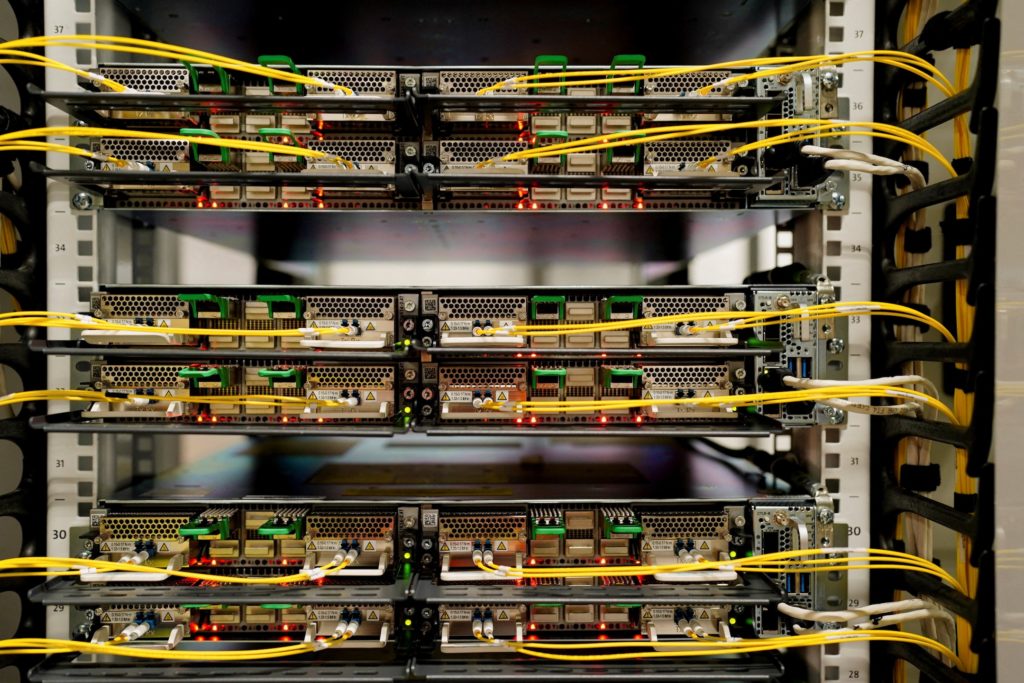President Trump is reportedly drafting an executive order that would override state regulations on artificial intelligence. The order would create a task force within the Justice Department to sue and potentially withhold federal funding from states that pass their own AI laws. Jeff Bennett spoke in more detail with Rip Current’s technology journalist Jacob Ward.
Jeff Bennett:
President Trump is reportedly drafting an executive order that would override state regulations on artificial intelligence. The order creates a task force within the Justice Department to sue and potentially withhold federal funding from states that pass their own AI laws.
In a social media post earlier this week, the president wrote, “We must have one federal standard, not a patchwork of 50 state regulatory systems, or we will easily be overtaken by China in the AI race.”
Joining us now to find out all about it is Rip Current founder and veteran technology journalist Jacob Ward.
Jake, it’s always nice to see you.
Jacob Ward, Rip Current Founder:
Jeff, thank you so much for having me. I really appreciate it.
Jeff Bennett:
of course.
So, as the Washington Post first reported, the draft executive order specifically targets new AI laws in Colorado and California. What do these laws actually do, and how do states argue that they are necessary?
Jacob Ward:
Well, I think the first argument here, Jeff, is that these are absolutely the only laws that we have. There are currently no federal regulations regarding AI. That’s where the state stepped in, right?
There’s a famous saying that states are the laboratories of the law, and that’s exactly what’s happening here. That means, for example, in places like Colorado, about 6 million people are protected from discrimination that can come through AI when it comes to employment, housing, job applications, health insurance, and everything else.
California has a very strong law that was just signed by the governor that basically says they can look inside the security and safety protocols of these companies. And significant protections apply to whistleblowers. These are the kind of things you would imagine federal laws to be.
But in the absence of that, the state had to get involved here. And for some reason, all of a sudden, the federal government is now in the position of saying these laws don’t hold up, without actually proposing an alternative to them, Jeff.
Jeff Bennett:
Let’s talk more about why. Because we’ve seen many top technology executives from Nvidia, Google, and Apple visit the White House on a regular basis.
According to your report, does this reflect their wishes? In other words, how much influence do these companies have in shaping AI policy?
Jacob Ward:
Well, I think there’s no question that these companies would like to have a federal standard forever so they don’t have to deal with a patchwork of state laws.
One can also draw a kind of connective tissue between these companies – companies whose heads attended the inauguration, recently attended a state dinner with Mohammed bin Salman, and donated money to renovate the White House ballroom.
Indeed, what no one is responding to here is national sentiment. Not only did a last-ditch effort to get this kind of moratorium into legislation before Congress failed by a vote of 99-1, but Americans don’t feel that way.
According to a Gallup poll released in September, 80% of American adults think the government should maintain rules around AI safety and data security, even if it means slowing down the development of AI capabilities, which directly contradicts what President Trump is claiming in this leaked memo obtained from all these news outlets that somehow our country is falling behind China and as a result it’s worth repealing the laws here, Jeff.
Jeff Bennett:
What President Trump is claiming and what Elon Musk is predicting — As we all know, Elon Musk made a lot of eyebrow-raising statements this week.
He predicted that advances in AI will eventually make jobs voluntary. For many people, that’s not fun. It’s scary that the average American can be replaced by any number of robots, yet companies only care about productivity.
Jacob Ward:
Yes, the rhetoric you hear from the leaders of these companies is actually very ideological. They really seem to have some kind of faith-based idea that on the other side of mass chaos, there’s going to be a utopia where we’re all suddenly going to be painting watercolors in our gardens.
I think what we’ve seen in American history is that we tend not to pay people to do watercolors in their gardens. We tend to want to pay people for their work. And one way to understand what Mr. Musk is saying here is the idea that we won’t have to work anymore.
But the real impact we’re hearing from the heads of these companies could just be widespread job losses. Dario Amodei, head of Anthropic, said in the same sentence that we might cure cancer and balance the budget, but unemployment could reach 20%.
That can happen here. So if you believe, as the heads of these companies do, that there’s a utopia on the other side of this that’s worth going through with it all, then so be it. But I think economists and historians would say this is going in a different direction, Jeff.
Jeff Bennett:
Perhaps 20 percent will be unemployed.
Okay, Jacob Ward, I always look forward to seeing you at Rip Current.
Jacob Ward:
appreciate. thank you.



